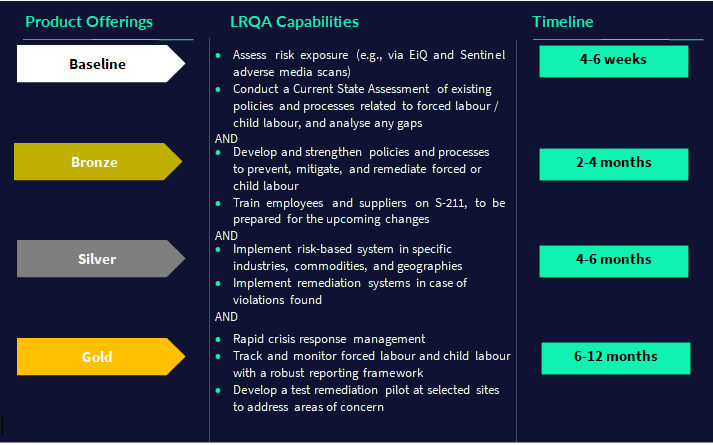The Forced Labour and Child Labour in Canadian Supply Chains Act (“S-211”) imposes specific requirements on companies to report their forced labour and child labour risks throughout their supply chains by 31 May 2024.
Overview
The passage of Canadian law S-211 is a pivotal development. Compliance with S-211, which is mandatory for many companies operating in Canada, further underscores the need for companies to know their suppliers and require them to effectively manage key human rights risks. S-211 defines clear expectations in its reporting requirements, laying the foundation for companies to enact or enhance their risk mitigation strategies and due diligence programs. Complying fully with S-211 is important not only for legal compliance but also to meet customer and investor expectations concerning forced labor and child labour risks.
Canada’s regulation follows an increasing number of due diligence regulations enacted worldwide. LRQA’s recent publication outlines current global ESG legal requirements here.
What must companies do now to meet reporting requirements by 31 May?
Reporting obligations apply to companies that:

Companies can review the questionnaire published by the Canadian Government that outlines key reporting expectations. Companies need to complete the questionnaire and submit a written report on FY 2023 by 31 May 2024.
The questionnaire must include responses to:
- Mandatory questions requiring essential data for compliance with S-211, including entity identification and reporting requirements, and
- Optional open-ended questions giving opportunities for entities to elaborate further on their responses and provide additional information, within a character limit.
The report should include information on:
- Steps taken during the previous financial year to prevent and reduce the risk of forced or child labor;
- Company’s management structure, sustainability / responsible sourcing activities, and description of supply chains;
- Policies and due diligence processes in place;
- Measures taken to remediate any forced labor or child labour; and
- Training provided to employees on forced labor and child labor.
- The law requires the Board and at least one Director to sign off on a company’s report, so companies should be socializing this requirement now with company leadership and actively strategizing about report contents.
- The first report is due on or before May 31, 2024, and annually thereafter. Entities are required to submit their report to the Minister of Public Safety as well as share it publicly on their website.
- Businesses face potential pecuniary fines of up to CA$250,000 for (i) failure to submit a report, (ii) obstruction of related investigations, or (iii) knowingly making false or misleading statements.
How LRQA can support S-211 compliance
LRQA supports companies on forced and child labor supply chain risk management, in line with the expectations listed in the Canadian law. LRQA’s expertise with implementing forced and child labor due diligence programs, coupled with our services which support modern slavery risk mitigation, double materiality assessments, and sustainability disclosures, enable us to support clients with S-211 compliance and related measures.
For example, LRQA can support companies with:
- Drafting or reviewing S-211 reports to help with compliance with the 2024 requirements. LRQA can also support with aligning S-211 reports with other sustainability reporting requirements or standards.
- Developing a risk-based due diligence system, integrated throughout the business, to manage forced and child labor risks, including through tracking and monitoring.
- Coordinating a North America child labour grievance mechanism and implementing Corrective Action Plans (CAPs) and remediation.
- Developing crisis response strategies, drawing upon our expertise in forced labour and child labour prevention and response.
- Deploying data analytics via EiQ, the world’s first end-to-end supply chain ESG due diligence and assurance platform, which enables our clients to develop a risk-based approach that efficiently targets risks and enables strategic focus. Companies that use this tool better demonstrate to regulators that they are aware of their risks and taking appropriate action to respond, mitigating their own risks to operate while preventing human rights risks.
- Deploying digital learning services (e.g., on forced and child labour, supply chain due diligence, etc.) in both French and English, to help ensure internal and/or supplier understanding and compliance with the Canadian legislation.
Support Options
LRQA supports companies to comply with S-211 and implement forced labour and child labor due diligence systems through various possible approaches. Companies can choose the support options best suited for them, ranging from immediate compliance to establishing a robust, proactive due diligence system.

